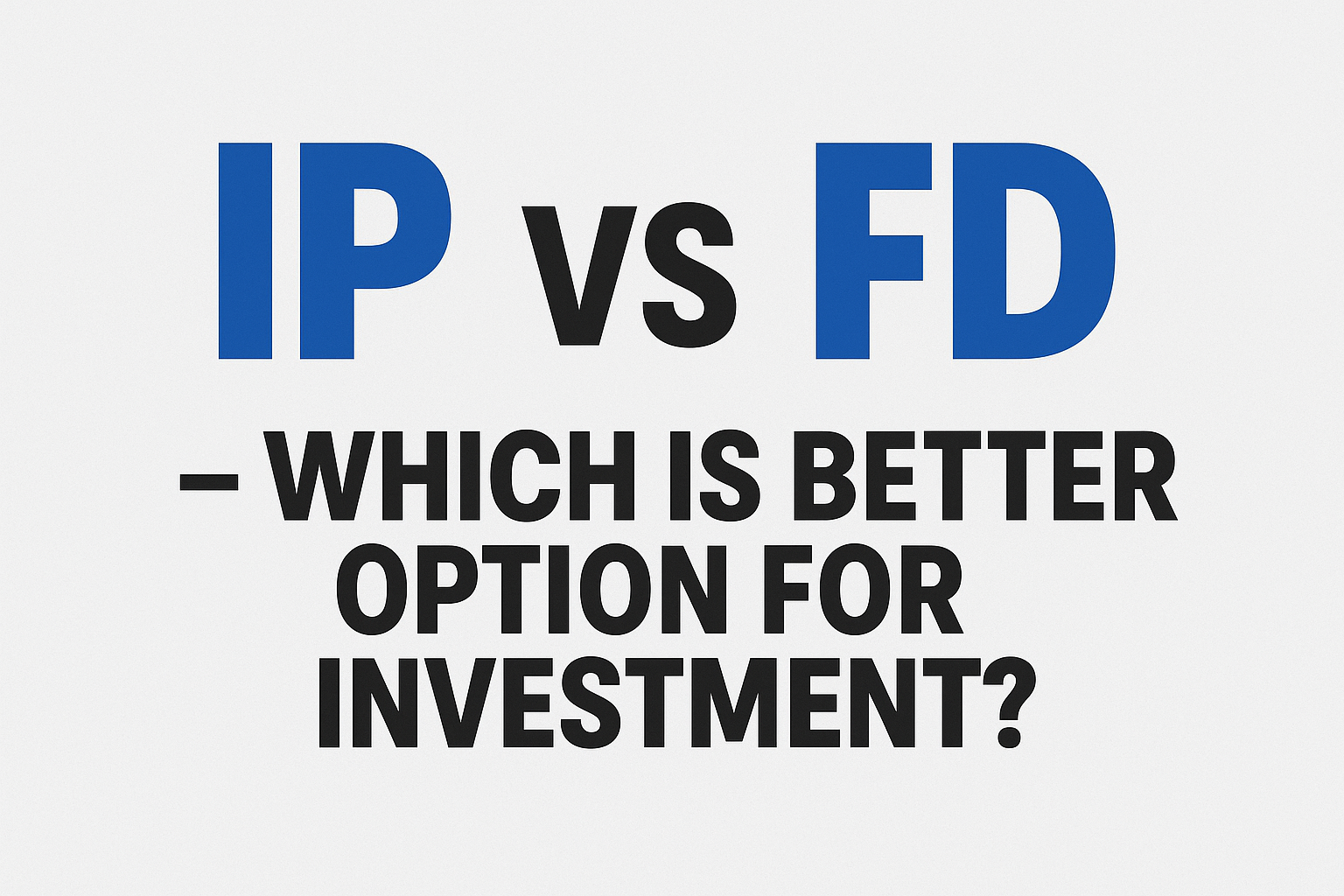SIP VS FD -Which is Better Option For Investment?

Everyone wants that their money should not only be saved but also grow gradually. But when it comes to investment, the first confusion is this – should we do Fixed Deposit (FD) or SIP (Systematic Investment Plan)?
If you are also confused and want to understand which option will be better for your money, then this article is for you. In this blog, we will explain to you in very simple language, without any technical jargon, which of the two options can be more beneficial for you.
1) First of all, what is a Fixed Deposit?
Fixed Deposit is a traditional investment method in which you deposit a fixed amount of money in a bank or financial institution for a fixed period of time. You get a fixed interest rate on this amount, which remains the same for the entire period.
Main benefits of FD
- Security: Returns guaranteed by the bank.
- Fixed interest: You know at the beginning how much money you will get at the end.
- Better option for the elderly: Many banks offer higher interest to senior citizens.
- Single-investment: A lump sum amount is invested at one time.
2)Some limitations of FDs:
- Low returns: Interest rates are around 5-7%.
- Impact of inflation: Money in FDs grows slower than inflation.
- Tax: Interest may be taxable (if annual interest is more than ₹40,000/₹50,000).
- Limited liquidity: There may be a penalty for premature withdrawal.
Now let’s know what is SIP?
SIP VS FD -Which is Better Option For Investment? SIP i.e. Systematic Investment Plan is a way of investing in mutual funds. In this, you invest a fixed amount every month, which is invested in mutual fund schemes related to the stock market. SIP gives you the facility of discipline and long-term wealth creation.
Benefits of SIP:
- Start with a small amount: You can start with as little as ₹500.
- Magic of compounding: Returns grow exponentially over time.
- Risk management: Investing a small amount every month reduces market risk.
- Tax benefits (ELSS): Some SIP schemes (like ELSS) offer tax exemption.
- Liquidity: Money can be withdrawn from the fund if needed.
Risks of SIP
- Market based: Returns are not guaranteed.
- Short term volatility: Market fluctuations can affect returns.
- Scheme selection is important: Choosing the wrong fund can lead to low returns.
3) Comparison Table SIP VS Fixed Deposit.
| Aspects | Fixed Deposit | SIP |
| Returns | Returns 5-7% (Fixed) | 10-15% (Long Term Average) |
| Risk | Vey Low Moderate | Market Dependent |
| No Tax Benefits | Taxable interest | Tax Saving In ELLS SIP |
| Flexibility | less | more |
| Starting amount | ₹1000 or more | Less than ₹500 |
| Does not provide | protection | against inflation |
| Premature withdrawal | penalty is applicable | in most schemes |
| target growth | limited | More |
A real-life example
Suppose, you invest ₹5,000 every month for the next 10 years:
Investment Method Total Amount Expected Returns Total Amount (after 10 years)
FD @ 6.5% ₹6,00,000 ₹2,77,000 ₹8,77,000
SIP @ 12% ₹6,00,000 ₹5,62,000 ₹11,62,000
Note: SIP returns are estimated and based on market performance.
How to make an informed decision?
Now that you know the pros and cons of both the options, the next question is – “Which is right for me?”
If you are young:
- SIP is a better option.
- Start with a small amount and invest for the long term.
If you have responsibilities:
- Do a mix of FD + SIP.
- Keep emergency fund in FD and SIP for future growth.
For senior citizens:
- FD should be the priority.
- Good for safety and regular income.
Also Read :- Wise vs PayPal vs Revolut vs Western Union: Best Way to Send Money Internationally in 2025
How To Start An Ecommerce Business (*2025) – Full Details
What is better from tax perspective?
- Interest on FD is taxable (bank automatically deducts TDS).
- SIP (ELSS funds) is tax beneficial (up to ₹1.5 lakh under Section 80C).
- Long term capital gain (LTCG) is applicable on SIP, but up to ₹1 lakh is tax free.
Smart Investment Strategy
- Keep FD for short term goals (like buying a car in 2 years)
- Keep SIP for long term goals (like buying a house, children’s education)
- Always keep emergency fund in FD or savings account
Conclusion: How to make the right decision?
Every person’s financial situation is different, so the right investment should also be personal. Both FD and SIP have their own benefits. With the right planning and information, you can balance both and get better results.
Final Thoughts
If you want financial freedom, it is not enough to just save money — it also needs to be invested wisely.
Whether you choose FD or SIP – the key is to invest regularly, be patient and make decisions based on your goals.
Your next steps:
- Consult your bank or financial advisor about both SIP and FD.
- It is better to invest small amounts regularly rather than investing a large amount at once.
- Start today, because the sooner you start, the more your money will grow.

